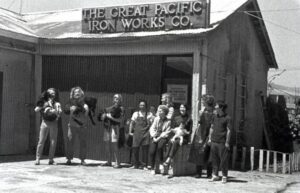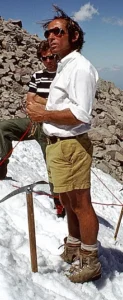 Back in the 1960s, Yvon Chouinard was a leading Yosemite rock climber, who soon would be doing world-class alpine climbs.
Back in the 1960s, Yvon Chouinard was a leading Yosemite rock climber, who soon would be doing world-class alpine climbs.
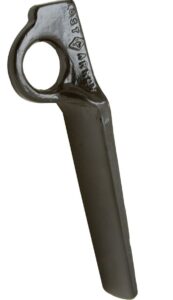 The equipment for this kind of climbing largely didn’t exist, so he invented and made it, revolutionizing both techniques and gear. In those days, he made his “Lost Arrow” pitons, named after an iconic Yosemite rock spire, in a small blacksmith shop and sold them to climbers from his car trunk.
The equipment for this kind of climbing largely didn’t exist, so he invented and made it, revolutionizing both techniques and gear. In those days, he made his “Lost Arrow” pitons, named after an iconic Yosemite rock spire, in a small blacksmith shop and sold them to climbers from his car trunk.
The tiny one-man business took off, and he eventually added crampons, ice axes, and other climbing gear to his product line. By the 1970s, Chouinard equipment was the climbing gear to have, unmatched in design and quality.
He also was in the forefront of the “clean climbing” revolution that replaced pitons, which damage rock, with jam nuts and other rock anchors that don’t. This was in response to scarring of rock cracks in Yosemite and other popular rock climbing areas.
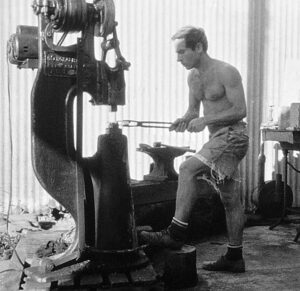 Then, Chouinard’s climbing equipment business was bankrupted by a lawsuit. Some nimrod misusing his gear was killed in a fall, and his relatives sued. It was a bad case, but the cost of legal defense ruined him. His handful of employees acquired the assets from the bankruptcy court and incorporated a company called Black Diamond to continue making his gear designs.
Then, Chouinard’s climbing equipment business was bankrupted by a lawsuit. Some nimrod misusing his gear was killed in a fall, and his relatives sued. It was a bad case, but the cost of legal defense ruined him. His handful of employees acquired the assets from the bankruptcy court and incorporated a company called Black Diamond to continue making his gear designs.
Meanwhile, he began selling rugby shirts, and Patagonia was born. Over the years, he and his wife built a huge apparel-based business, and became billionaires.
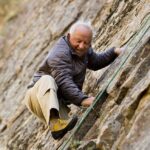 Yvon Chouinard is now 83 years old, his legendary climbing exploits long in the past. Today, they donated their company to “a climate-focused trust and group of nonprofit organizations, called the Patagonia Purpose Trust and the Holdfast Collective respectively, the company said in a statement, noting ‘every dollar that is not reinvested back into Patagonia will be distributed as dividends to protect the planet.’” (See story here.)
Yvon Chouinard is now 83 years old, his legendary climbing exploits long in the past. Today, they donated their company to “a climate-focused trust and group of nonprofit organizations, called the Patagonia Purpose Trust and the Holdfast Collective respectively, the company said in a statement, noting ‘every dollar that is not reinvested back into Patagonia will be distributed as dividends to protect the planet.’” (See story here.)
This won’t shock anyone who knew him, or knew about him. From early days, Chouinard went about “reimagining” capitalism. His business motto was, “Let my people go surfing.” He tried to make his businesses — his small equipment-making shop, and his giant apparel company — worker-friendly workplaces. He was never about making money for himself, but saw his financial success as a way to help the planet.
Patagonia is worth about $3 billion and he’s giving it all away, with the ~$100 million a year of income to go for protecting Earth’s wild places. That’s a drop in the bucket in terms of what’s needed. But it’s an enormous statement of one person’s love for the only planet we have.
